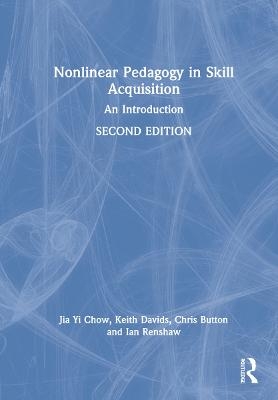
Nonlinear Pedagogy in Skill Acquisition
Routledge (Verlag)
978-1-032-16194-5 (ISBN)
Nonlinear Pedagogy is a powerful paradigm for understanding human movement and for designing effective teaching, coaching and training programmes in sport, exercise and physical education (PE). It addresses the inherent complexity in learning movement skills, viewing the learner, the learning environment and the teacher or coach as a complex interacting system. The constraints of individual practice tasks provide the platform for functional movement behaviours to emerge during practice and performance.
The second edition includes new materials, of practical, theoretical and empirical relevance, to enhance understanding of how to implement a Nonlinear Pedagogy to support learning in sport, PE and physical activity. There is updated, in-depth discussion on the various pedagogical principles that support Nonlinear Pedagogy and how these principles are applicable in learning designs in sports and physical education. There is further emphasis on examining how transfer of learning is implicated in practice, highlighting its relevance on skill adaptation and talent development.
The first part of the book updates the general theoretical framework to explain processes of skill acquisition and motor learning. This edition draws clearer links between skill acquisition, expertise and talent development, focusing on how specificity and generality of transfer have a role to play in the development of learners.
The book defines Nonlinear Pedagogy and outlines its key principles of practice. It offers a thorough and critical appraisal of the functional use of instructional constraints and practice design. It discusses methods for creating challenging and supportive individualised learning environments at developmental, sub-elite and elite levels of performance. The second part focuses on the application of Nonlinear Pedagogy in sports and PE. There is a greater emphasis on helping applied scientists and practitioners understand the impact of Nonlinear Pedagogy on transfer of learning. Every chapter is updated to provide relevant contemporary cases and examples from sport and exercise contexts, providing guidance on practice activities and lessons. Nonlinear Pedagogy in Skill Acquisition is an essential companion for any degree-level course in skill acquisition, motor learning, sport science, sport pedagogy, sports coaching practice, or pedagogy or curriculum design in physical education.
Jia Yi Chow is currently the Assistant Dean (Degree Programme) at the Office of Teacher Education and a member of staff at the Physical Education and Sports Science Academic Group at the National Institute of Education, Nanyang Technological University, Singapore. His primary research area is in nonlinear pedagogy, which is underpinned by key theoretical perspectives from dynamical systems and ecological psychology. His other research interests include examining multi-articular coordination and visual search strategies captured within sports expertise. Jia Yi works closely with the Physical Education and Sports Teachers Academy (PESTA) at the Ministry of Education, Singapore, and also the Singapore Sports Institute. Keith Davids is Professor of Motor Learning at the Centre for Sports Engineering Research, Sheffield Hallam University, UK. He currently holds the position of Finnish Distinguished Professor at the Faculty of Sport and Health Sciences, University of Jyväskylä, Finland. He has held professorial positions in the UK, New Zealand, Australia and Finland. His research in ecological dynamics investigates constraints on emergent coordination tendencies in athletes and sports teams. These key ideas have been integrated into a nonlinear pedagogy, informed by his work on motor learning design in sport. He currently supervises doctoral students from the UK, France, Finland, Portugal, Australia and New Zealand. He has worked with elite sport development agencies including the New Zealand South Island Academy, the Queensland Academy of Sport, the Australian Institute of Sport, Diving Australia, Cricket Australia and the English Institute of Sport. Chris Button works at the School of Physical Education, Sport and Exercise Sciences, University of Otago in Dunedin, New Zealand. His research interests include fundamental movement skill development and water safety. Chris also coaches (football) and provides a skill-acquisition consultancy for a number of sports in New Zealand. Chris is an executive committee member of the Australasian Skill Acquisition Research Group (ASARG). Ian Renshaw is based in the School of Exercise & Nutrition Sciences, Queensland University of Technology, Brisbane, Australia. His research interests are in ecological dynamics and nonlinear pedagogy with particular emphasis on the development of sporting expertise. Ian is currently Head Coach of Toombul DCC in the Brisbane Grade Cricket competition. Ian is also an executive committee member of the Australasian Skill Acquisition Research Group (ASARG).
1. Overview and Introduction to Skill Performance and Learning from an Ecological Dynamics Perspective
2. (Re)organising Movement System Degrees of Freedom to Achieve Intended Task Goals: The Basis for Skilled Performance in Sport
3. An Ecological Dynamics rationale for a Nonlinear Pedagogy
4. Nonlinear Pedagogy: An Overview of Key Principles
5. How Functional, Adaptive Variability Can Promote Individualised Learning
6. Specificity of Transfer and Representative Learning Design
7. How Should We Use Informational Constraints in Nonlinear Pedagogy?
8. Relations between Nonlinear Pedagogy and Games-based Teaching Approaches
9. The Motivational Impact of Nonlinear Pedagogy
10. Emotions of Learning in a Nonlinear Pedagogy Perspective
11. How Principles of Nonlinear Pedagogy Can Support Talent Development
12. Applications of a Nonlinear Pedagogy in Physical Education and Sport Contexts
| Erscheinungsdatum | 04.01.2022 |
|---|---|
| Zusatzinfo | 12 Tables, black and white; 19 Line drawings, black and white; 23 Halftones, black and white; 42 Illustrations, black and white |
| Verlagsort | London |
| Sprache | englisch |
| Maße | 174 x 246 mm |
| Gewicht | 580 g |
| Themenwelt | Sachbuch/Ratgeber ► Sport |
| Geisteswissenschaften ► Psychologie ► Allgemeine Psychologie | |
| Weitere Fachgebiete ► Sportwissenschaft | |
| ISBN-10 | 1-032-16194-9 / 1032161949 |
| ISBN-13 | 978-1-032-16194-5 / 9781032161945 |
| Zustand | Neuware |
| Informationen gemäß Produktsicherheitsverordnung (GPSR) | |
| Haben Sie eine Frage zum Produkt? |
aus dem Bereich


